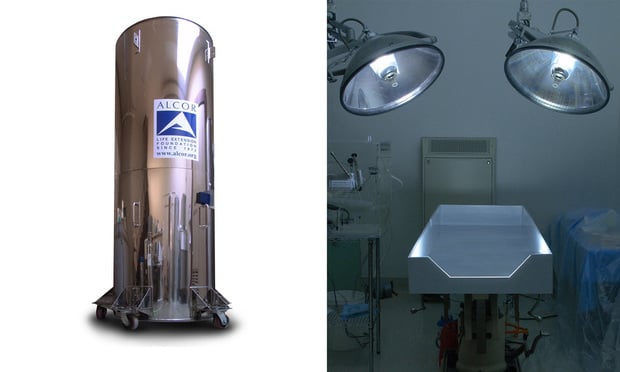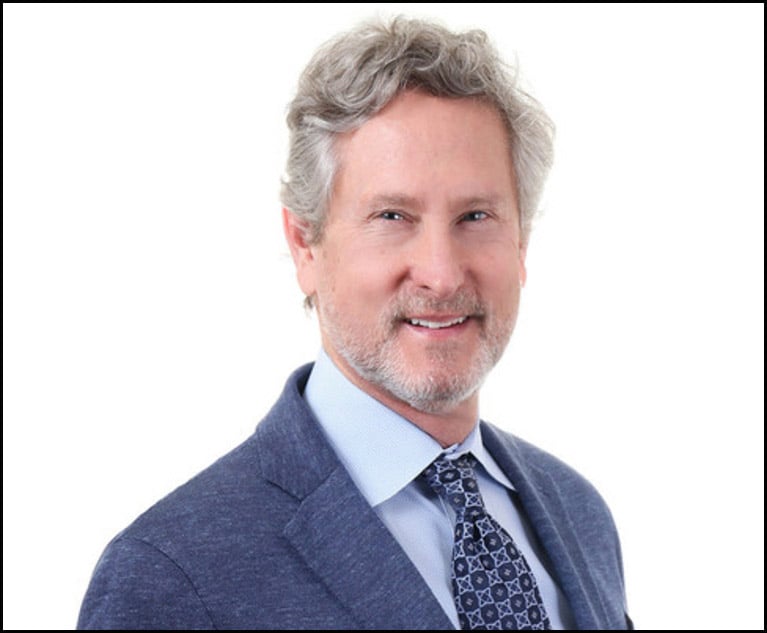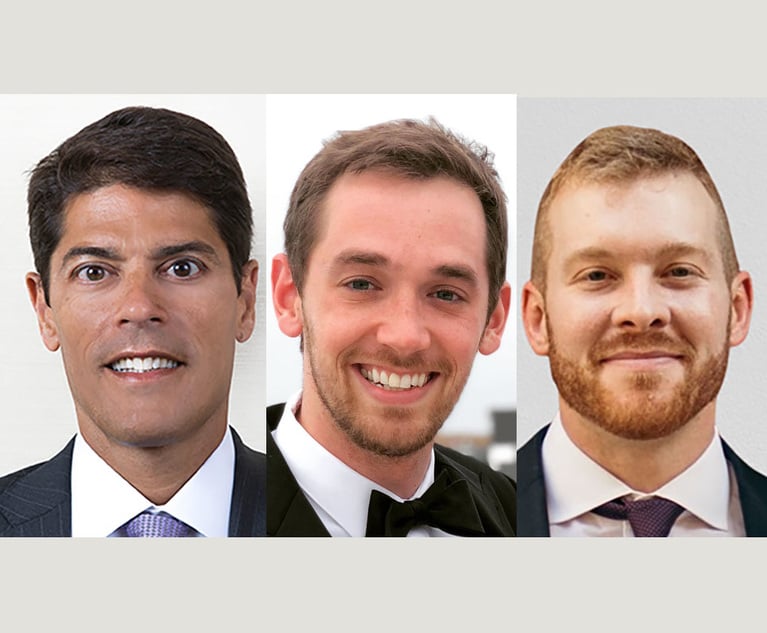Daily Dicta: In Fight Over Frozen Head, Quinn Emanuel Heats Up the Stakes
This is a lawsuit about a frozen head. And it involves Quinn Emanuel Urquhart & Sullivan founder John Quinn. Need I say more?
January 16, 2020 at 12:44 AM
7 minute read
 This "Bigfoot" Dewar is custom-designed to contain four wholebody patients and five neuropatients immersed in liquid nitrogen at -196 degrees Celsius. The Dewar is an insulated container which consumes no electric power. Liquid nitrogen is added periodically to replace the small amount that evaporate. Right, the Alcor operating theater (Photo courtesy of Alcor Life Extension Foundation)
This "Bigfoot" Dewar is custom-designed to contain four wholebody patients and five neuropatients immersed in liquid nitrogen at -196 degrees Celsius. The Dewar is an insulated container which consumes no electric power. Liquid nitrogen is added periodically to replace the small amount that evaporate. Right, the Alcor operating theater (Photo courtesy of Alcor Life Extension Foundation)
This is a lawsuit about a frozen head. And it involves Quinn Emanuel Urquhart & Sullivan founder John Quinn.
On days like this, I love my job. I'm like Renee Zellweger in "Jerry Maguire": You had me at frozen head.
Still, this isn't just some esoteric oddball of a case. It also touches squarely on the right to decide in advance what will happen to your body after you die.
Quinn and QE partner Diane Cafferata represent Alcor Life Extension Foundation, which bills itself as "the world's leading cryonics organization since 1972."
 Alcor is locked in a nasty fight with Kurt Pilgeram, whose father Laurence died in 2015 at age 90, leaving clear instructions that he wanted to be cryogenically frozen.
Alcor is locked in a nasty fight with Kurt Pilgeram, whose father Laurence died in 2015 at age 90, leaving clear instructions that he wanted to be cryogenically frozen.
Alcor has Laurence's head—it's preserved at the non-profit's Arizona facility, stored under liquid nitrogen at a temperature of -196°C—but has yet to be paid for its services.
Kurt wants the head back, to preserve (or not) "as he deems appropriate." He also wants millions in damages from Alcor for emotional distress—in part, he's upset because only the head was preserved, and not his father's entire body.
He also claims the non-profit engaged in financial elder abuse, "inducing elderly people to sign up for cryonic preservation under the terms of an agreement that are largely illusory."
Alcor on Tuesday fired back, seeking to set aside and vacate the court's probate order on Laurence's $16 million estate—a move that could leave Kurt with just $1 of inheritance.
But I'm getting ahead of myself … (groan).
Laurence Pilgeram, who had a PhD in Biochemistry and taught at the University of Illinois College of Medicine, the University of Minnesota School of Medicine and Baylor College of Medicine, was involved in cryonics from its infancy. In 1971, he gave a talk at the Cryonics Conference in San Francisco ("Abnormal in-Vitro Oxidation and Lypogenesis Induced by Plasma in Patients with Thrombosis"), and joined Alcor as a "cryopreservation member" in 1991.
Which sorry, doesn't sound like Alcor tricked some gullible old man into signing up for cryonic preservation, even if Pilgeram was 67 at the time he became a member. I suspect the elder abuse claim is a non-starter.
David Tappeiner of Fell, Marking, Abkin, Montgomery, Granet & Raney, who represents Kurt Pilgeram, did not respond to a request for comment.
Laurence died from an apparent heart attack on April 10, 2015 in Santa Barbara, California, and was found on a public sidewalk. His death was on a Friday, and according to Kurt, no one from Alcor returned his call over the weekend notifying them of his father's passing.
Instead, Alcor didn't find out until Monday. Alas, when you're freezing a body, time is of the essence.
Per Alcor's version of events, although medical and police personnel were aware of Laurence's Alcor bracelet, "he was taken to the medical examiner's office in Santa Barbara, as they did not understand Alcor's process. … Fortunately, no autopsy was performed which at least eliminated any invasive damage but the lengthy delay led to a straight freeze as the only remaining option."
Only Laurence's head (or "cephalon"—my new word of the day) was preserved, although his contract with Alcor called for a whole body freeze.
According to Kurt, Alcor reps initially assured him that his father's entire body would be preserved. But two weeks later, he said he got a package in the mail which purportedly contained his father's cremated remains, minus the head.
"Alcor arbitrarily, fraudulently and in bad faith elected to sever Mr. Pilgeram's head from his body," Tappeiner wrote in a cross complaint filed in Santa Barbara Superior Court in 2018.
"In addition to failing to preserve Mr. Pilgeram's whole body," he continued, "Alcor had no right to cremate Mr. Pilgeram's remains." Instead, he said, the remains should have been sent to Laurence's next of kin.
None of this sounds good for Alcor, but there are other factors in play.
Laurence had a $123,000 life insurance policy that named Alcor as the beneficiary. The proceeds were supposed to pay for the cryogenic procedure. But Kurt challenged the payout and the insurer filed a federal interpleader action.
Kurt's initial concern was whether Alcor had in fact properly preserved his father's head. Alcor offered him an on-site inspection, but Kurt requested and received photographic proof. (Not included as an exhibit. I checked.)
Kurt and Alcor in 2015 agreed to dismiss the case, but the money remains in escrow—Alcor has not received a cent.
Two years later, Kurt proposed a new "settlement"—one where he gets all the life insurance money and Alcor gives him the head. In response, Alcor sued him in Santa Barbara Superior Court for failing to honor the terms of the 2015 agreement.
In the latest twist, Alcor in court papers filed on Jan. 14 says it has uncovered evidence of extrinsic fraud by Kurt and his brother Karl (who isn't named) and aided by attorney Erin Parks, a Santa Barbara solo practitioner.
The Quinn team said Kurt, an administrator of the estate, didn't provide Alcor with official notice of the probate proceeding, as required under California law and the Due Process Clause of the Fourteenth Amendment.
Instead, "Alcor was led to believe that the interpleader action would be settled, and the money released, upon a showing by Alcor that Laurence's cephalon was in fact being preserved by Alcor," they wrote. "These misrepresentations and omissions, along with the fact that they did not give Alcor notice of the probate proceeding, deprived Alcor of its day in court."
"As a direct result of his misconduct, Alcor has accrued millions of dollars of damages in defending itself against a frivolous and malicious lawsuit challenging the cryonic preservation that everyone in that suit agrees Laurence wanted and in enforcing Laurence's right to have his remains cryonically preserved as he undisputedly intended," the filing states.
Kurt also allegedly told the probate court that his father died without a will, and concealed Laurence's testamentary directions regarding the disposition of his remains. These included a no-contest clause that specifically disinherited anyone who attempted to interfere with his cryonic preservation.
"If any heir contests, attacks, or acts contrary to the directions of this instrument, I give that heir the sum of one dollar ($1.00)," the provision states.
By challenging Alcor, the Quinn team argues, Kurt "has acted directly contrary to Laurence's testamentary desires… Due to the operation of the testamentary directions, Kurt is entitled to no more than a dollar, and is wrongfully in receipt of any and all amounts more than one dollar, from Laurence's estate."
Trial is set for September before Judge Donna Geck in Santa Barbar
This content has been archived. It is available through our partners, LexisNexis® and Bloomberg Law.
To view this content, please continue to their sites.
Not a Lexis Subscriber?
Subscribe Now
Not a Bloomberg Law Subscriber?
Subscribe Now
NOT FOR REPRINT
© 2025 ALM Global, LLC, All Rights Reserved. Request academic re-use from www.copyright.com. All other uses, submit a request to [email protected]. For more information visit Asset & Logo Licensing.
You Might Like
View All
Litigators of the Week: A Trade Secret Win at the ITC for Viking Over Promising Potential Liver Drug

Litigation Leaders: Mark Jones of Nelson Mullins on Helping Clients Assemble ‘Dream Teams’

Litigators of the Week: Ingersoll Rand Enforces a Noncompete Against an Exec Who Jumped Ship to Verboten Competitor

Litigator of the Week: After Years Repping Prenatal Testing Client, First-Time First Chair Lands a $57M Patent Damages Verdict
Law Firms Mentioned
Trending Stories
- 1Big Law Firms Sheppard Mullin, Morgan Lewis and Baker Botts Add Partners in Houston
- 2Lack of Jurisdiction Dooms Child Sex Abuse Claim Against Archdiocese of Philadelphia, says NJ Supreme Court
- 3DC Lawsuits Seek to Prevent Mass Firings and Public Naming of FBI Agents
- 4Growth of California Firms Exceeded Expectations, Survey of Managing Partners Says
- 5Blank Rome Adds Life Sciences Trio From Reed Smith
Who Got The Work
J. Brugh Lower of Gibbons has entered an appearance for industrial equipment supplier Devco Corporation in a pending trademark infringement lawsuit. The suit, accusing the defendant of selling knock-off Graco products, was filed Dec. 18 in New Jersey District Court by Rivkin Radler on behalf of Graco Inc. and Graco Minnesota. The case, assigned to U.S. District Judge Zahid N. Quraishi, is 3:24-cv-11294, Graco Inc. et al v. Devco Corporation.
Who Got The Work
Rebecca Maller-Stein and Kent A. Yalowitz of Arnold & Porter Kaye Scholer have entered their appearances for Hanaco Venture Capital and its executives, Lior Prosor and David Frankel, in a pending securities lawsuit. The action, filed on Dec. 24 in New York Southern District Court by Zell, Aron & Co. on behalf of Goldeneye Advisors, accuses the defendants of negligently and fraudulently managing the plaintiff's $1 million investment. The case, assigned to U.S. District Judge Vernon S. Broderick, is 1:24-cv-09918, Goldeneye Advisors, LLC v. Hanaco Venture Capital, Ltd. et al.
Who Got The Work
Attorneys from A&O Shearman has stepped in as defense counsel for Toronto-Dominion Bank and other defendants in a pending securities class action. The suit, filed Dec. 11 in New York Southern District Court by Bleichmar Fonti & Auld, accuses the defendants of concealing the bank's 'pervasive' deficiencies in regards to its compliance with the Bank Secrecy Act and the quality of its anti-money laundering controls. The case, assigned to U.S. District Judge Arun Subramanian, is 1:24-cv-09445, Gonzalez v. The Toronto-Dominion Bank et al.
Who Got The Work
Crown Castle International, a Pennsylvania company providing shared communications infrastructure, has turned to Luke D. Wolf of Gordon Rees Scully Mansukhani to fend off a pending breach-of-contract lawsuit. The court action, filed Nov. 25 in Michigan Eastern District Court by Hooper Hathaway PC on behalf of The Town Residences LLC, accuses Crown Castle of failing to transfer approximately $30,000 in utility payments from T-Mobile in breach of a roof-top lease and assignment agreement. The case, assigned to U.S. District Judge Susan K. Declercq, is 2:24-cv-13131, The Town Residences LLC v. T-Mobile US, Inc. et al.
Who Got The Work
Wilfred P. Coronato and Daniel M. Schwartz of McCarter & English have stepped in as defense counsel to Electrolux Home Products Inc. in a pending product liability lawsuit. The court action, filed Nov. 26 in New York Eastern District Court by Poulos Lopiccolo PC and Nagel Rice LLP on behalf of David Stern, alleges that the defendant's refrigerators’ drawers and shelving repeatedly break and fall apart within months after purchase. The case, assigned to U.S. District Judge Joan M. Azrack, is 2:24-cv-08204, Stern v. Electrolux Home Products, Inc.
Featured Firms
Law Offices of Gary Martin Hays & Associates, P.C.
(470) 294-1674
Law Offices of Mark E. Salomone
(857) 444-6468
Smith & Hassler
(713) 739-1250






